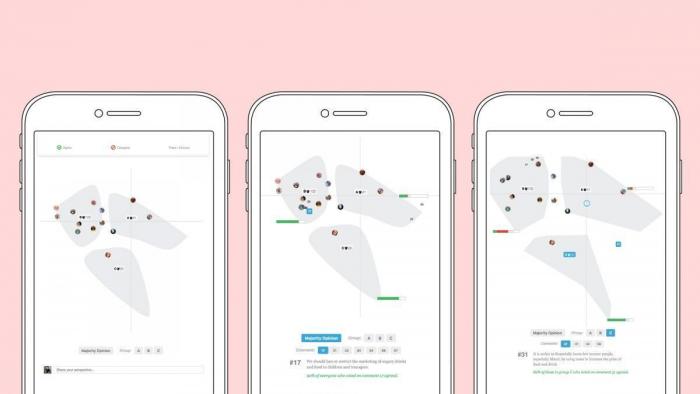- Forum
- categories
- Announcements and miscellaneous
- Miscellaneous - any other topic
- Public Participation Methods that Scale: "Pol.is is a new way to gather open ended feedback from large groups of people." [www based Open-Source-Software]
Public Participation Methods that Scale: "Pol.is is a new way to gather open ended feedback from large groups of people." [www based Open-Source-Software]
5386 views
Public Participation Methods that Scale: "Pol.is is a new way to gather open ended feedback from large groups of people." [www based Open-Source-Software]
Examples where Pol.is been used:
New Zealand: blog.pol.is/pol-is-case-study-temperature-check-a02dff7cc838
Taiwan: civichall.org/civicist/vtaiwan-democracy-frontier/
Canada: www.canada.ca/en/canadian-heritage/progr...ty/backgrounder.html
Engagement platform POL.IS
POL.IS is a digital public engagement platform designed to gather feedback from large groups around a particular topic. It excels at gathering a diversity of opinion without giving priority to any particular aspect of the discussion. It also allows for conversations to evolve on a single platform, regardless of the official language with which a participant prefers to interact.
participedia.net/en/methods/polis
Definition
Polis is a new way to gather open ended feedback from large groups of people. It is well suited to gathering organic, authentic feedback while retaining minority opinions.
Problems and Purpose
The problem with surveys and comments
Think of the comment field at the end of a survey, or the comment section at the end of a news article. Both allow participants to write down whatever they think.
Humans will need to process the massive amount of text that results. This creates a burden on both survey research teams and comment moderators, respectively. It is also impossible to discern whether a given viewpoint is representative of the majority or not.
How polis is different
Polis overcomes these challenges and produces meaning from open ended responses. Participants can write what they think, but they can also agree and disagree with what others are saying one comment at a time. This process happens in real-time. As soon as someone writes, others can vote.Polis runs statistical analysis on these voting patterns, also in real-time. It produces opinion groups and surfaces the comments that brought each group together. It also surfaces comments that found broad consensus among participants.
Polis scales to any number of participants, even millions. It accomplishes this by combining crowd behavior and machine learning. Humans can do what they are good at - reading text and forming snap judgments, as well as comparing statements. Computers can do what they are good at - finding patterns in large data sets.
Motivation
Polis wanted people to feel safe.
Polis wanted people to feel listened to.
Polis wanted people to be able to jump into a conversation at any time in its life-cycle.
Polis did not want them to feel intimidated or exhausted by the complexity of what had already occurred. That meant ditching threading and direct replies, so that comments didn't twist into a tangled nest.
Polis wanted everyone to be able to get a sense of what others felt, and what the consensus was, in seconds.
Polis wanted to preserve minority opinions. Polis doesn't use downvoting to invalidate upvoting. Polis doesn't use upvoting to invalidate upvoting. If it did, like other comment systems do: 200 upvotes + 200 downvotes = net zero votes. That math obscures the fact that there was some minority who felt differently, which we take as data to preserve. This took the form of creating and showing opinion groups.
Polis wanted to create a system that increased the number of roles available. More roles means more data, and more interesting outcomes. Somewhere south of 1% of users comment. Most users lurk - read but don't interact in the community. Pol.is typically sees 10x more people vote than those who comment.
Polis wanted to produce lots of usable data.
Polis wanted to show people as grouped with those who felt similarly. It's satisfying and validating to find your tribe.
Polis wanted to restrict the power of individuals to ruin a conversation with bad behavior.
Polis wanted to avoid the echo chamber effect of social networks.
Most generally, Polis wants to:
provide transparency,
produce insight,
decentralize power
in all kinds of organizations of people anywhere on Earth.
Best regards,
Detlef
"simple" Sanitation-Solutions by gravity
Low-Tech Solutions with High-Tech Effects
"Inspired by Circular Economy and Cooperation"
www.flickr.com/photos/aqua-verde/
Please Log in to join the conversation.
You need to login to reply- Forum
- categories
- Announcements and miscellaneous
- Miscellaneous - any other topic
- Public Participation Methods that Scale: "Pol.is is a new way to gather open ended feedback from large groups of people." [www based Open-Source-Software]








